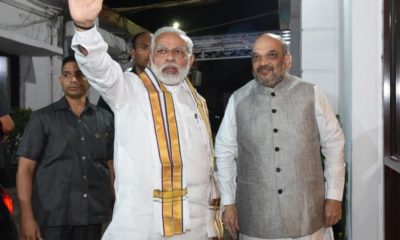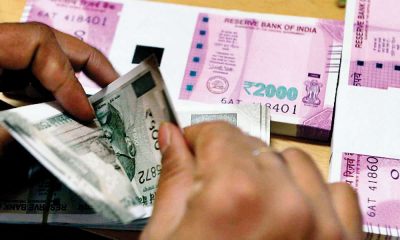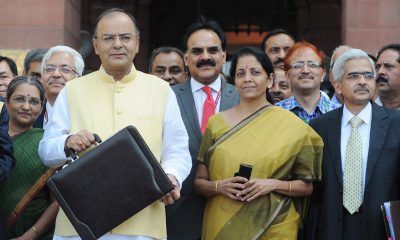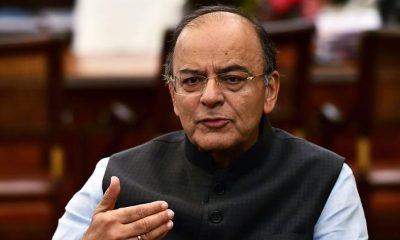National
India Inc gives thumbs up to Railway Budget

 New Delhi: All the major political parties may have criticised the Railway Budget for 2016-17 presented by Railway Minister Suresh Prabhu on Thursday, but the Indian business fraternity hailed it, terming it a pragmatic budget with no passenger fare hike.
New Delhi: All the major political parties may have criticised the Railway Budget for 2016-17 presented by Railway Minister Suresh Prabhu on Thursday, but the Indian business fraternity hailed it, terming it a pragmatic budget with no passenger fare hike.
The views of the corporate bigwigs:
Harshavardhan Neotia, President, Federation of Indian Chambers of Commerce and Industry:
It is an extremely pragmatic rail budget based on the three critical strategy pillars, aimed at making railways the backbone of India’s overall development. The rationalisation of freight policy and review of public-private-partnership policy framework would help to attract private players for transforming rail transportation and increasing the revenue.
Sumit Mazumder, President, Confederation of Indian Industry
Reliance on technology through introduction of train sets, power saving initiatives and enhancement of passenger amenities will go a long way in improving the customer experience from Indian railways. Measures such as expanding of freight basket, building terminal capacity, among others would help augment revenues.
Sunil Kanoria, President, Associated Chambers of Commerce of India:
Railway Minister has given a no-tariff-hike budget without compromising on the capital expenditure for increasing carrying capacity, both passengers and freight even in a challenging economic environment marked by a severe slowdown in the commodity sectors, which are lifeline of railway’s earnings.
Mahesh Gupta, President, PHD Chamber of Commerce and Industry:
The employment focus of the budget is highly encouraging as railways shall generate 23 crore many days by 2018-19 of which 9 crore man-days are envisaged in 2017-18 and 14 crore in 2018-19. The rail budget 2016-17 rightly focuses on socio-economic upliftment of masses as the introduction of Antyodya Express and addition in Deen Dayalu coaches for unreserved travel rightly asserts it.
Anuj Puri, chairman and country head, JLL (Jones Lang Laselle) India:
Railway Minister Suresh Prabhu’s announcement today on redevelopment of 400 stations through the private-public partnership (PPP) model is a very progressive and welcome move. This project will foster a plethora of large transit-oriented developments across the country, possibly resulting in the largest TOD (transit oriented development) undertaking in the world and thereby leading to higher transit ridership.
Vineet Agarwal, managing director, Transport Corporation of India (TCI) Group:
Connectivity of airports with railways would give a boost to the perishable goods sector and this would encourage the use of multi-modal transportation. However the budget doesn’t address explicitly the efforts to increase the share of movements by rail compared to road sector. The modal mix is still heavily tilted to road and the recent drop in fuel prices has further fueled the growth in road movements. In the same period rail freight rates have increased making it a big challenge for industry to shift.
M.N. Vidyashankar, president, India Electronics & Semiconductor Association (IESA):
In this budget, Indian Railways has taken a step further towards smarter transportation. GPS- based digital display in coaches and the introduction of bar-coded tickets not only bring more transparency but will also enhance security and comfort for the traveling public. The scheme of Wi-Fi installations in 500 railway stations by next year, will witness a further reduce in the country’s digital gap.
Mukesh Butani, managing partner, BMR Legal:
Prabhu didn’t give in to hiking fare as an easy solution to resources woes. Instead, he has proposed enhanced revenue mobilization through more innovative means. Amongst key misses, last year’s announcement about a five year investment plan of Rs.9 lakh crore didn’t find any mention.
Pushpinder Singh, co-founder and CEO, Travelkhana
The government move of expanding e-catering to 400 stations and decouple food distribution with food preparation will be extremely helpful for us.
Sharat Dhall, President, Yatra.com
It is also good to witness a slew of initiatives that will use modern technology such as Wi-Fi at stations, automated ticket machines, bio toilets and bar coded tickets and all this with no hike in passenger fares. The rail budget is also looking to enhance connectivity to the northeastern states and the beautification of stations at pilgrimage centres which will help promoting tourism to these places.
Ravi Uppal, MD, JSPL:
The railway budget is in line with the government’s vision of achieving holistic growth of the Indian Railways. It is very heartening to note that the government is focused on developing railway infrastructure with renewed vigour and is targeting a capital expenditure of Rs.1.21 lakh crore for 2016-17; an increase of 20 percent year-on-year.
Ajay Kapur, MD & CEO, Ambuja Cement:
Railway Minister Suresh Prabhu’s second rail budget displays a positive approach towards tackling issues, a commitment towards quality management and an attempt to make structural changes. Despite a tough financial and economic situation, customers have been spared from any fare hike.
Arindam Guha, senior director, Deloitte in India:
The Kharagpur Vijaywada freight corridor would provide an additional transport backbone for the proposed East Coast Economic Corridor extending from Chennai to Kolkata. It would also provide an additional fillip to the newly-formed state of Andhra Pradesh. All states benefitting from these corridors should take this opportunity to develop industrial clusters along these corridors and start related activities like land acquisition etc.
India Ratings and Research:
The proposed budget does not envisage an increase in passenger kilometre or passengers, however earning from various segments are forecasted to grow by an average of 10-12 percent, thus leaving the door open for fare hikes during the year.
Mahesh Y Reddy, director general, Infrastructure Industry and Logistics Federation of India:
The railway minister has done delicate balancing by re-imagining railway operations to make it among the best in the world and at the same time proposing to meet the increased expenses mainly by monetising the assets at its command and borrowing from multilateral institutions and national sources like LIC.
National Association of Software and Services Companies (NASSCOM):
Aimed at showcasing a positive future for railways in India; the inclusion of GPS based digital displays in coaches, and the setting up Wi-Fi internet in 100 stations this year, are initiatives that will not only streamline services in the railways, but also benefit customers across the board.
National
Foodman Vishal Singh Honored for Hunger Free World Mission in Bangkok

Lucknow: Vishal Singh, a renowned social worker from Lucknow, also known as Foodman, has once again made India proud. He was honored by the Happy Hands Gloves Cooperative Limited Company in Korathai, Thailand, for his work with the Hunger Free World Mission.
The Hunger Free World Mission’s meeting was held in Korathai, Thailand, under Vishal Singh’s leadership. Representatives from several countries, including Mr. Raja Dwivedi (Managing Director of Happy Hands Gloves Limited), Thailand Coordinator Mr. Raja Mishra, and member Mr. Varun Singh, attended the event.

Under Vishal Singh’s leadership, the attendees took a pledge to work together toward creating a hunger-free world.
Speaking on the occasion, Vishal Singh explained that the main goal of the Hunger Free World Mission is social participation. He said the mission is not just about feeding people but also about meeting other basic needs of those who are struggling. The mission focuses on helping families of terminally ill patients in hospitals by providing food and shelter. It also works to fulfill essential needs like education, jobs, and care for the elderly.
For the last 16 years, the Vijay Sri Foundation has been providing free services, benefiting thousands of people. Vishal Singh highlighted that the mission aims to gain global recognition like other organizations such as WHO, WWF, and Red Cross, which work for social causes.
During this meeting, Vishal Singh was appointed as the Chairman of the Hunger Free World Mission by representatives from various countries. They also discussed holding regular meetings in different countries to push the mission forward.
Business tycoon Dr. Abhishek Verma has also supported this humanitarian mission, vowing to promote the idea of “Seva Parmo Dharma” (Service is the highest duty) worldwide. Vishal Singh praised him, stating that people like Dr .Abhishek Verma inspire others to work for the betterment of society.
Recently, Romania’s Ambassador, Mr . Daniela Sezonov Ţane, invited Vishal Singh to the Romanian Embassy in Delhi, where they discussed the mission in detail. Impressed by his humanitarian work, she honored Vishal Singh and invited him to Romania to take the mission forward .
Food man Vishal Singh has been serving the people of India for the past 16 years. Through the Vijay Sri Foundation, he provides free meals to cancer patients & their families ,shelter, and education for women & children along with running free old-age homes in Lucknow.
In addition to his humanitarian work, Vishal Singh also addresses issues like crime and corruption through his role as Chairman of Seva Path Media and Managing Director of Vijay Sri Foundation.

During the COVID-19 pandemic, Vishal Singh and his team worked tirelessly to provide food and help to the needy, including starving children, elderly citizens, and pregnant women. Despite contracting the virus himself, he continued to assist others after his recovery. He even created a life-saving oxygen regulator using household items, which was praised by doctors both in India and abroad.
In his address at the meeting, Vishal Singh spoke about his mission to create a hunger-free world. He pointed out that India’s large population, along with issues like unemployment and poverty, has caused the country to fall on the Hunger Index. He urged people to contribute just one handful of grains daily to help create a hunger-free world.
He concluded by saying that through social participation, we can empower the people around us, meet their basic needs, and work together to build a stronger, more prosperous, and developed society.




















